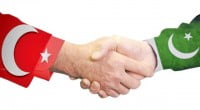Exit from a well 1,915 meters deep

Date posted: April 24, 2013
MARKAR ESAYAN
As Turkey is putting an end to its denial policy or at least going through a significant change in this regard, it is impossible to stick to the red lines of the old ideological mentality concerning the 1915 forced relocation of Armenians.
The democratic progress made and reforms implemented during the last 10 years have already produced a serious curiosity and urge for understanding about this issue. Every sane person has asked the following question: Now that the official version of the past is not true, how could its account of the 1915 incidents be true? Why should we not question it?
The banishment of Armenians from their lands through massacres and exiles in 1915 is not a problem specific to Armenians. It is one of the main reasons why the Committee of Union and Progress (CUP) and its supporters forced the country to join World War I so as to endanger the entire country and make an impact on its fate. Unfortunately, this ideological preference was inherited by the newly established republic, paving the way for the emergence of a number of serious problems such as the Kurdish, Alevi, Armenian and deep state issues. The violence to which the Armenians had been subjected came to be imposed on Kurds, non-Muslim religious minorities who chose to stay in the country, Alevis, Muslims and all dissident groups, albeit with a changing magnitude depending on the conjuncture. This practice helped preserve the totalitarian nature of the regime, and democracy couldn’t flourish in this country.
Thus, people not only refrained from questioning the sins of the pro-CUP ideology but also glorified the logic and ethics of these sins. The tendency to cover up these sins made it possible to overthrow a democratically elected government once every 10 years and inject hatred and animosity into social groups. Certain segments of society even long regarded the execution of a prime minister and two ministers during the military coup of 1960 as a democratic achievement thanks to this polarization.
After about a century, Turkey is now facing the sins of its past. The prime minister has made an official apology for the massacres of Alevis and Kurds in Dersim between 1937 and 1938. And the pressures backed by the law on non-Muslim religious minorities are being eased. Not everything is perfect, but there is certainly positive progress. Most importantly, the state is quickly stripping itself of the old state’s mentality. Society is becoming freer and people are starting to ask questions and bad things do not happen to them as they seek to find answers to these questions. This is because everyone in this country has problems with the past. These problems signify the injustices suffered. People realize a new order won’t be permanent if these injustices are not redressed through confrontation and remedies.
The Great Tragedy (Meds Yeghern) Armenians suffered in 1915 is part of this story, and it is perhaps the starting point of this story. If the confrontation with 1915 had occurred during the establishment of the republic, i.e., if the offenders of the massacre had not been employed in the civilian and military bureaucracy of the state, then the story would probably be very different. Thus, a problem that is today causing tensions for Turkey would have been settled at that time. But we would also not be experiencing other problems stemming from this mentality.
There is also the Armenian side of the story. As a people who have been banished from their homeland with a great trauma under whatever pretext was found for it, Armenians have been trying to tell everyone that they have suffered from a great injustice for the last 98 years. Therefore, they couldn’t start to mourn for their losses and they remain stuck in 1915. But as Hrant Dink put it, this was a gross evil done by the CUP supporters to the entire country. To get rid of this disease, Turks need Armenians and vice versa.
I am not talking about state policies. Rather, I say, it is high time both nations shared their common sorrows and healed each other. They must jettison the radical tendency to see Turks as genocidal and Armenians as anti-Turk. They must share this sorrow and exit together from the wrong path we took at the start. I think this is the only correct formula.
Source: TodaysZaman, 24 April 2013
Tags: Armenian issue |
























